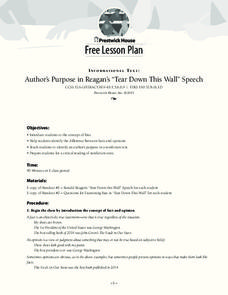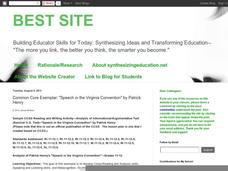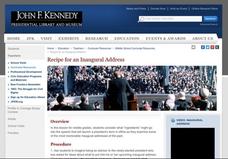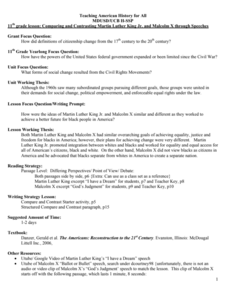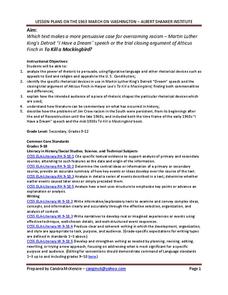ReadWriteThink
Analyzing Famous Speeches as Arguments
A speaker, a message, an audience. After analyzing these elements in Queen Elizabeth's speech to the troops at Tilbury, groups analyze how other speakers use an awareness of events, and their audience to craft their arguments....
Prestwick House
Author’s Purpose in Reagan’s “Tear Down This Wall” Speech
President Ronald Reagan's "Tear Down This Wall" speech, delivered on June 12, 1987 before the Berlin Wall, provides class members with an opportunity to examine three key aspects of informational text: author bias, the use of facts and...
National Endowment for the Humanities
García Márquez’s Nobel Prize Speech: “The Solitude of Latin America”
To conclude a study of One Hundred Years of Solitude, class members analyze Gabriel Garcia Marquez's Nobel Prize in Literature acceptance speech. After a whole-class discussion of the main ideas in the speech, individuals draft a...
Utah Education Network (UEN)
Classical Appeals and War Speeches
Discuss classical appeals of rhetoric through the speeches of Winston Churchill and FDR. Learners read, annotate, and analyze the speeches by the men before using a graphic organizer to track the use of ethos, pathos, and logos.
EngageNY
Reading Closely and Introducing Rhetoric Toolbox: Unions as Agents of Change—Part 1
Scholars explore the question of whether labor unions are the agents of change as they continue reading César Chávez's 1984 speech, "Address to the Commonwealth Club of California." They discuss rhetoric in Chávez's speech and discover...
Literacy Design Collaborative
Elie Wiesel's Acceptance Speech Analysis
Elie Wiesel's Nobel Prize Acceptance speech provides young historians with an opportunity to demonstrate their ability to use evidence from the speech. They work together to analyze how Wiesel uses rhetorical devices and syntax to...
Curated OER
Rhetorical Devices in a Primary Source
Analyze Martin Luther King Jr.'s famous and powerful "I Have a Dream" speech as a primary source document. After reading up on rhetorical devices and working in small groups to define terms, class members identify and explain the use of...
Curated OER
Ethos, Logos, and Pathos in Civil Rights Movement Speeches
Examine three speeches while teaching Aristotle's appeals. Over the course of three days, class members fill out a graphic organizer about ethos, pathos, and logos, complete an anticipatory guide, read speeches by Martin Luther King Jr.,...
Curated OER
Speech in the Virginia Convention
“. . .different men often see the same subject in different lights. . .” but the great orator Patrick Henry used all the skills at his command to craft a speech to convince listeners to see things as he did--that liberty was worth dying...
Franklin D. Roosevelt Presidential Library & Museum
Pearl Harbor Activity #4: Who is the Audience?
Young historians use the prompts on a worksheet to analyze President Roosevelt's "Day of Infamy" speech. They identify the intended audience for the speech, the devices FDR used to persuade his audience, the responses promoted, and the...
John F. Kennedy Presidential Library & Museum
Recipe for an Inaugural Address
An inaugural address represents the first moments of a new beginning. Using John F. Kennedy's speech as a model for guided practice, groups examine the ingredients of an inaugural address. Individuals then repeat the analysis process...
Shakespeare in American Life
"We Few, We Happy Few": Motivational Speech in Henry V
Class members may "think themselves accurs'd" when they first hear of an assignment that asks them to create a motivational speech. After studying the Saint Crispin's Day speech from Shakespeare's Henry V; however, they will count...
Rancocas Valley Regional High School
Teaching American History for All
Although Dr. Martin Luther King, Jr. and Malcolm X both work for equal rights, social change, and political empowerment, their approaches were radically different. To better understand these contrasts, class members compare King's "I...
National Constitution Center
Born in the U.S.A: Music as Political Protest
Though often used in shows of patriotism, Bruce Springsteen's 1985 song "Born in the U.S.A." is critical of America's role in the Vietnam war and its treatment of American veterans. High schoolers analyze the song's lyrics in an activity...
Curated OER
The Art of Persuasion-Analysis of Argument
Analyze advertising techniques in order to pinpoint persuasive strategies that writers use. These same techniques are then examined in persuasive speeches. You will have to find your own advertisements, but speeches are included. Finish...
K20 LEARN
It's All About Balance! Parallel Structure
I came, I saw, I conquered! Parallel structure, employed by writers even before Julius Caesar, is the focus of a lesson that teaches young writers the power of this rhetorical device. Class members analyze speeches by Dr. Martin Luther...
Albert Shanker Institute
Making the Case for Equality: A Comparison
Martin Luther King Jr's " I Have a Dream" speech and Atticus Finch's closing argument during the trial of Tom Robinson both address the societal need to overcome racism. After examining the rhetorical devices and figurative language used...
Franklin D. Roosevelt Presidential Library & Museum
Pearl Harbor Activity #1: Newspaper or Radio Account
After listening to President Franklin D. Roosevelt's "Day of Infamy" speech, young historians research information about the Japanese attack on Pearl Harbor, possible motives for the attack, and the consequences of the attack. Scholars...
K20 LEARN
LBJ and Voting Rights
Challenges to voting rights is not a new thing. Using President Lyndon B. Johnson's 1965 "The American Promise" speech on voting rights as a starting point, young historians research current voting rights laws and challenges.
K20 LEARN
Say It with Style: Syntax and Parallel Structure
Dr. Martin Luther King, Jr.'s "I Have a Dream" speech provides the text for a lesson plan that introduces scholars to the significance of syntax. After examining several types of clauses, phrases, and structures, class members use the...
Nemours KidsHealth
Peer Pressure: Grades 9-12
Peer pressure is not always negative. It can also inspire, encourage people to get involved, and help push change. Class members select a quotation from a provided list and craft a paragraph about the meaning of the statement, how it...
Albert Shanker Institute
Dream Under Development
As part of their study of the 1963 March on Washington, class members do a side-by-side comparison of the original text of Martin Luther King's "I Have a Dream Speech" with a transcript of the speech he delivered. The take away from the...
Teaching Tolerance
Using Photographs to Teach Social Justice | Advertisements Promoting Activism
Activism can create real change. Class members examine a series of photographs that represent a different form of activism. Individuals then craft a persuasive speech in which they argue why the photo they chose is the best example of...
Ohio Literacy Resource Center
Arguing with Aristotle Ethos, Pathos, Logos
Introduce your classes to the Art of Rhetoric with a lesson that focuses on Aristotle's persuasive appeals and how they have been used, both ethically and unethically, to influence opinion.



